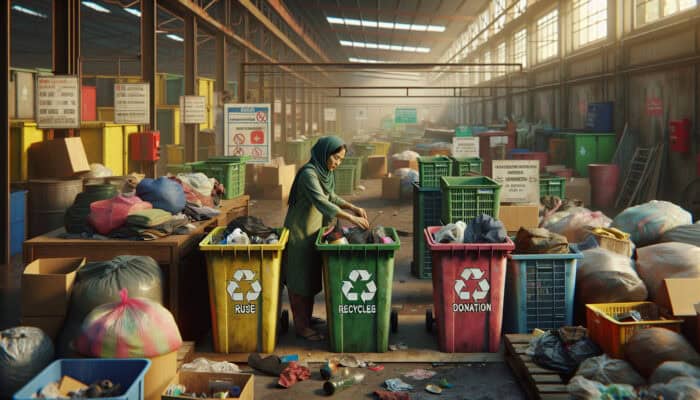Transform Your Home with Effective Green Decluttering Strategies
What is Green Decluttering and Why is it Important?

Green decluttering represents a revolutionary approach that transcends traditional methods of clearing out your living space. This practice involves a thoughtful and purposeful strategy aimed at significantly reducing waste while prioritising environmentally friendly practices during your home clearance process. It encourages individuals to reflect deeply on their possessions and consider their ultimate fate rather than discarding them indiscriminately. Instead of merely throwing away unwanted items, green decluttering advocates for recycling, repurposing, or donating, thus nurturing a healthier living environment and contributing to a more sustainable planet.
The fundamental principle of green decluttering focuses on two key aspects: it not only helps to establish a well-organised physical space but also aims to minimise your ecological footprint. In an era where sustainable living has become crucial, adopting green decluttering methods resonates with individuals who wish to coexist harmoniously with their environment. In the UK, where the issue of landfill waste is particularly pressing, embracing green decluttering can instigate significant positive transformations.
Why Choose Green Decluttering for Your Home?
Engaging in green decluttering is a proactive and responsible choice that yields substantial benefits for the environment. By actively working to reduce contributions to landfills and promoting recycling initiatives, you play an essential part in fostering a healthier planet. This practice goes beyond simple eco-consciousness; it cultivates a sustainable lifestyle, allowing you to connect with a growing community dedicated to minimising our collective ecological impact. Such efforts ensure that future generations inherit a planet abundant in resources and a cleaner ecosystem.
Furthermore, embracing green decluttering can also offer considerable financial benefits over time. By prioritising recycling and opting for second-hand goods instead of new purchases, you not only save money but also contribute to sustainability efforts. This approach fosters a more thoughtful attitude towards consumerism, enabling you to make informed decisions about your belongings and identify what is truly necessary for your life.
Uncover the Benefits of Green Decluttering
The advantages of green decluttering extend well beyond the immediate satisfaction of a tidy home. One of the most significant benefits is the reduced environmental impact. By opting for recycling and donating items, you alleviate pressure on landfill sites and conserve natural resources. Every small action contributes to a more sustainable future, underscoring the importance of individual efforts in the broader context of environmental preservation.
Additionally, green decluttering can lead to significant financial savings. By selling or donating items you no longer require, you can generate extra income while decreasing the need for new purchases. This cycle of reuse and recycling encourages a more sustainable consumer culture. Moreover, green decluttering promotes a mindful approach to your possessions, prompting deeper contemplation about what you choose to keep and why. This introspection often results in greater satisfaction and appreciation for the items that truly matter to you.
How to Start Your Green Decluttering Journey Effectively?

Embarking on your green decluttering journey does not need to be a daunting task. A practical initial step is to categorise your belongings into reuse, recycle, and donate. This structured approach simplifies the decision-making process regarding each item's future. It is also crucial to familiarise yourself with local recycling centres and charities to ensure that your efforts are both effective and environmentally responsible. Understanding local regulations can significantly enhance your green decluttering experience.
A common hurdle many face is the reluctance to part with specific items. It is essential to remember that the focus should be on quality, not quantity, when determining what to retain. Designate specific times to assess your belongings, approaching the task with clear intentions. This clarity will guide your decisions and reinforce your commitment to sustainable practices.
What Common Pitfalls Should You Avoid in Green Decluttering?
While green decluttering presents numerous benefits, it is crucial to approach it correctly to optimise its advantages. One common error is improper recycling, where individuals inadvertently place items in the wrong bins, undermining their recycling efforts. To prevent this, educate yourself on local recycling regulations and ensure you understand what can and cannot be recycled in your area.
Another frequent mistake is over-donating to charity shops without considering their capacity. Many charitable organisations struggle with surplus donations, leading to waste if items cannot be sold. Before donating, evaluate the condition and demand for the items to ensure they are genuinely needed. Additionally, many people overlook opportunities to repair or repurpose items, opting instead to dispose of them prematurely. Embracing creativity can extend the lifespan of your possessions and significantly enhance your decluttering impact.
Gain Insights from Experts on Effective Green Decluttering Techniques
How Can Professionals Enhance Your Green Decluttering Efforts?

Professionals who specialise in green decluttering can provide invaluable insights and tailored guidance, greatly enhancing the efficiency and eco-consciousness of your decluttering efforts. Their expertise allows them to offer personalised strategies on sorting, recycling, and the appropriate disposal methods for various items. By aligning your efforts with best practices for sustainability, you can maximise your positive impact on the environment.
Here are some expert recommendations for successful green decluttering:
- Evaluate each item for its usefulness and emotional significance before determining its fate.
- Utilise technology to keep track of your possessions and identify items you can part with.
- Engage with local environmental organisations for information on recycling and waste disposal.
- Schedule regular decluttering sessions to maintain an organised and clutter-free living space.
Experts also emphasise the importance of sharing your decluttering goals with family members or housemates to ensure everyone is aligned. This collaborative effort can foster a cohesive approach to maintaining a sustainable home environment.
What Are the Emerging Trends in Green Decluttering?
The landscape of green decluttering is continually evolving, with various trends gaining traction across the UK. One of the most prominent trends is <a href=”https://birminghamhouseclearance.com/upcycling-ideas-for-house-clearance-items-a-uk-guide/”>upcycling</a>. This innovative practice breathes new life into discarded items, transforming them into functional and aesthetically pleasing objects. It signifies a shift from merely discarding items to exploring creative ways to repurpose them.
Minimalism is another trend that harmonises beautifully with green decluttering. This lifestyle encourages owning fewer possessions, leading to cleaner, more organised spaces while decreasing the demand for new products. Many residents in the UK are embracing minimalism, which not only facilitates decluttering but also promotes intentional purchasing behaviours.
Technology is increasingly playing a vital role in green decluttering. Numerous applications are emerging to assist in tracking possessions and identifying items for recycling or donation, streamlining the decluttering process and making it more user-friendly.
Learn from Inspiring Real-World Examples of Green Decluttering Success
Several compelling case studies in the UK highlight the success of green decluttering initiatives. For example, Bristol has implemented numerous community projects focusing on recycling and upcycling, resulting in a notable reduction in landfill waste. Local workshops educate residents on how to transform unwanted furniture into artistic pieces, fostering community spirit and raising environmental awareness.
Another noteworthy initiative is London’s promotion of ‘swap shops’, where individuals can exchange items they no longer need. These events not only facilitate decluttering but also strengthen community ties and reduce waste. Participants frequently leave with newfound treasures, gaining a deeper appreciation for their belongings.
These real-world examples demonstrate that green decluttering is not merely an individual pursuit but rather a collective movement. By sharing resources and ideas, communities are driving change towards more sustainable living practices.
Kickstart Your Green Decluttering Journey Today
What Should You Prioritise During Your Decluttering Process?
When you begin your green decluttering journey, it is wise to focus on items that are simpler to sort and dispose of initially. Start with paper, plastics, and electronics, as these categories typically have established recycling channels and can quickly help you reduce clutter. The immediate results can inspire you to tackle more challenging items as you progress.
Consider this list of items to declutter first:
- Old newspapers and magazines
- Plastic containers and packaging
- Broken or outdated electronics
- Unwanted clothing and accessories
By concentrating on these categories, you not only clear physical space but also set a positive tone for your decluttering journey. Once you successfully manage these areas, gradually address more sentimental or challenging possessions.
How Should You Sort and Categorise Your Items Effectively?
Effective sorting and categorisation are essential components of a successful green decluttering experience. Create clear categories such as ‘recycle’, ‘donate’, ‘sell’, and ‘keep’. This framework simplifies the decision-making process, ensuring each item receives thoughtful consideration. Take your time with each category, making deliberate decisions regarding what to keep and what to let go.
Using bins or boxes labelled with these categories can help maintain organisation throughout the process. As you sort, ask yourself critical questions about each item: When did I last use this? Does it bring me joy? Is it truly useful? This reflective process enhances your decision-making and strengthens your connection to the items you choose to retain.
Strategies for Sustaining a Clutter-Free Environment
Maintaining a clutter-free home requires commitment and regular effort. An effective strategy is to schedule regular decluttering sessions. Whether monthly or seasonally, dedicating time ensures that your space remains organised and intentional.
Mindful purchasing is crucial in preventing clutter build-up. Before acquiring new items, consider whether they align with your minimalist lifestyle. Ask yourself if it is a necessity or a desire and whether it will genuinely enhance your space. This practice fosters a more sustainable relationship with consumer behaviour.
Embracing a minimalist lifestyle can also support your decluttering goals. Focus on the philosophy of quality over quantity, prioritising items that serve both functional and emotional purposes. This intentional approach enriches your living environment and strengthens your commitment to sustainability.
How to Safely Dispose of Hazardous Waste During Decluttering?
Proper disposal of hazardous waste is a critical aspect of green decluttering that requires careful consideration. Items such as batteries, paints, and chemicals must be handled appropriately to prevent environmental damage and comply with local regulations. Most local councils provide specific guidelines for hazardous waste disposal, often offering designated drop-off points or collection services.
Before discarding such items, familiarise yourself with local regulations. Know where hazardous waste facilities are located, and never dispose of these items in regular bins, as they can contaminate landfills and soil. Responsible disposal is not just a legal obligation; it is vital for protecting our environment.
Consider reaching out to local community groups or environmental organisations for additional resources on safe disposal practices. They often provide educational materials or programmes designed to help residents manage hazardous waste responsibly.
How Green Decluttering Positively Influences Mental Well-Being
A cluttered environment frequently contributes to feelings of overwhelm and stress. By embracing green decluttering, you pave the way for a cleaner, more organised home that can lead to improved mental health. An uncluttered space fosters clarity, facilitating greater focus and productivity. The act of decluttering itself can be therapeutic, providing a sense of accomplishment and control over your surroundings.
Moreover, a clutter-free environment supports a healthier lifestyle. It promotes better organisation, making it easier to maintain cleanliness and minimise allergens. This attention to your physical space can positively influence your emotional well-being as you cultivate a stronger connection to your home.
The process of green decluttering encourages mindfulness, which can alleviate anxiety and enhance overall life satisfaction. By consciously choosing what to keep and what to release, you develop a more intentional approach to your living space, ultimately benefiting your mental health.
Explore the Comprehensive Benefits of Green Decluttering
How Does Green Decluttering Enhance Environmental Sustainability?
Green decluttering profoundly impacts the environment, significantly reducing the ecological footprint associated with house clearance. By prioritising recycling and reuse, you help to minimise landfill waste, conserve natural resources, and decrease pollution. Each item you recycle or donate signifies a step toward a more sustainable planet.
This practice fosters a circular economy where products are designed for reuse, repair, and recycling. Such an approach not only alleviates pressure on our environment but also encourages responsible consumption patterns among individuals and communities. Every small effort contributes to a collective reduction in environmental degradation.
In What Ways Does Green Decluttering Save Money Over Time?
Green decluttering can lead to substantial financial savings in various aspects. First and foremost, selling or donating items you no longer use can yield immediate returns. Instead of allowing unused items to gather dust, consider listing them on local marketplaces or donating them to charity shops, creating a mutually beneficial situation.
Furthermore, maintaining a clutter-free home can prevent unnecessary purchases. With fewer items around, you are more likely to become mindful of what you genuinely need, leading to fewer impulse buys. This conscious consumer behaviour not only saves money but also fosters a more sustainable lifestyle.
Additionally, effective recycling can reduce waste disposal costs. Many local councils provide incentives for recycling, helping you save on waste collection fees while benefiting the environment. By engaging in green decluttering, you foster a more financially sustainable lifestyle.
What Psychological Benefits Can You Gain from Green Decluttering?
The psychological benefits of green decluttering are well-documented and significant. As you clear your space and maintain an organised environment, you experience a sense of accomplishment that boosts self-esteem and promotes a positive outlook. The act of decluttering can serve as a therapeutic outlet, offering relief from stress and anxiety.
An organised space fosters clarity, making it easier to concentrate on tasks and reducing feelings of overwhelm. This newfound mental clarity often translates into improved productivity and creativity, allowing you to engage more fully in daily activities. Additionally, creating an intentional living environment deepens your connection to your belongings, enhancing emotional well-being.
Ultimately, the mental clarity achieved through green decluttering can lead to a more harmonious existence, allowing you to surround yourself with items that truly resonate with your values and contribute to a more joyful and fulfilling life.
In What Ways Does Green Decluttering Support Sustainable Practices?
Green decluttering is fundamentally intertwined with sustainability. By promoting the reuse and recycling of items, you actively participate in decreasing the demand for new products, conserving resources, and reducing environmental harm. This practice cultivates a culture of sustainability that extends beyond individual actions, encouraging collective responsibility for our planet.
As you engage in green decluttering, you model sustainable behaviours for your family, friends, and community, inspiring others to follow your lead. This ripple effect contributes to a broader movement towards more sustainable living practices, reinforcing the importance of mindfulness in consumption.
Moreover, green decluttering aligns with the principles of a circular economy, where the lifecycle of products is extended through reuse and recycling. By embracing this mindset, you contribute to a sustainable future for generations to come, ensuring that our planet remains vibrant and viable.
What Are the Community Benefits Associated with Green Decluttering?
The community benefits stemming from green decluttering are substantial. When individuals donate items to local charities, they support organisations that rely on these contributions to fund their missions. Such support can be crucial for charities, enabling them to provide essential services and resources to those in need within the community.
Additionally, green decluttering fosters a sense of shared responsibility and connection. As community members engage in sustainable practices, they create a collective identity centred around environmental stewardship. Community events like swap shops or recycling drives promote collaboration and social cohesion while addressing waste reduction.
By participating in green decluttering initiatives, individuals can also encourage local businesses to adopt more sustainable practices, leading to a larger community shift towards sustainability. This collective effort enhances overall quality of life, ensuring a healthier environment for everyone.
Evidence-Based Benefits of Green Decluttering for House Clearance
What Insights Does Research Provide on Green Decluttering?
Research indicates that green decluttering can significantly alleviate environmental impact and foster sustainable living. Numerous studies highlight the positive effects of recycling and reusing items during house clearance, illustrating how these practices contribute to a healthier planet. By adopting green decluttering, individuals can play a crucial role in addressing the environmental crisis.
Beyond environmental considerations, research also emphasises the psychological benefits associated with decluttering. Individuals who engage in green decluttering report increased satisfaction and well-being, indicating a strong connection between organisation, mindfulness, and mental health. This body of evidence underscores the importance of embracing sustainable practices, not only for environmental reasons but also for personal fulfilment.
How Can Green Decluttering Enhance Your Life Experience?
Green decluttering has the potential to transform your life in numerous ways. By promoting a more sustainable lifestyle, you create a positive impact on the environment while simultaneously enhancing your personal well-being. As you reduce clutter, you cultivate a sense of organisation and control in your living space, leading to decreased stress and anxiety.
This practice encourages intentional consumption, prompting you to make deliberate choices about what you allow into your home. By prioritising quality over quantity, you foster a deeper appreciation for your belongings, resulting in a more fulfilling and harmonious living environment. Ultimately, green decluttering serves as a pathway to a more meaningful life, where each decision aligns with your values and aspirations.
Actionable Steps to Implement Green Decluttering in Your Home
Implementing green decluttering in your home can be both straightforward and rewarding. Start by establishing clear intentions for your decluttering journey. Identify specific areas or categories you want to address first, such as your wardrobe or kitchen.
Next, follow these actionable steps to enhance your green decluttering efforts:
- Sort items into categories: recycle, donate, sell, and keep.
- Research local recycling facilities and charities to understand their processes.
- Schedule regular decluttering sessions to maintain organisation.
- Encourage family members to participate in the decluttering process.
By taking these steps, you ensure that your green decluttering journey is both effective and sustainable. Each action contributes to creating a more organised home while positively impacting the environment.
Proven Strategies for Effective Green Decluttering and House Clearance
What Are the Most Effective Green Decluttering Strategies?
Implementing effective green decluttering strategies is crucial for a successful house clearance. Begin by categorising your items to streamline the process. Organising belongings into ‘recycle’, ‘donate’, ‘sell’, and ‘keep’ ensures that each item receives thoughtful consideration and appropriate handling.
Utilising local recycling facilities is essential. Familiarise yourself with your local council's recycling guidelines and take advantage of community programmes that promote waste reduction. Additionally, consider donating usable items to local charities, supporting those in need while alleviating landfill waste.
Here are some effective strategies for green decluttering:
- Regularly evaluate your belongings to prevent clutter accumulation.
- Engage in community recycling initiatives to promote sustainability.
- Opt for sustainable disposal methods for hazardous materials.
- Encourage friends and family to join your green decluttering efforts.
These strategies not only enhance your decluttering experience but also contribute to a broader culture of sustainability within your community.
How Can You Ensure Your Decluttering Efforts Are Truly Eco-Friendly?
To ensure that your decluttering efforts genuinely reflect green practices, it is vital to research local recycling options thoroughly. Understand which materials can be recycled in your area and follow the correct protocols. This diligence minimises the risk of contamination, which can lead to increased waste in landfills.
Choose sustainable disposal methods for items that cannot be recycled. Consider composting organic waste or donating usable items to charitable organisations. Additionally, avoid unnecessary purchases that contribute to waste, as this mindset nurtures a more sustainable lifestyle. By being mindful of your choices, you can maintain a green decluttering ethos long after your initial clearance.
Gain Expert Insights on Effective Green Decluttering Techniques
Expert analysis of green decluttering techniques reveals that successful decluttering relies on thoughtful organisation and sustainability practices. Many experts recommend starting small and focusing on specific areas within your home to avoid feeling overwhelmed. This strategy allows you to build momentum and confidence as you observe positive outcomes.
Additionally, using technology to track your possessions can provide valuable insights into what you own and help identify items to part with. Many applications assist with inventory management and can even suggest recycling options based on the items you wish to discard.
Successful green decluttering initiatives across the UK underscore the significance of community involvement and education. Many local councils offer workshops and resources that promote sustainable practices, encouraging residents to embrace green decluttering as a lifestyle choice. By following these expert insights, you can enhance your green decluttering journey and make a positive contribution to your environment.
Explore Available Resources and Support for Green Decluttering in the UK
Where Can You Find Green Decluttering Resources?
Numerous resources are accessible in the UK to support your green decluttering journey. Online guides offer valuable information on best practices for decluttering and recycling. Websites like Recycle Now and local council pages often feature comprehensive resources on recycling facilities, collection dates, and donation opportunities.
Furthermore, community centres frequently host workshops focused on sustainable living and decluttering techniques. Engaging with local environmental groups can connect you with like-minded individuals who share your dedication to sustainability. These networks often provide opportunities for collaboration and support in your decluttering efforts.
How Can Local Communities Encourage Green Decluttering Initiatives?
Local communities play a pivotal role in promoting green decluttering initiatives. By providing accessible recycling facilities and organising events such as swap shops or clean-up days, communities can cultivate a culture of sustainability. These events encourage residents to engage in decluttering activities while reinforcing the importance of waste reduction.
Additionally, community outreach programmes can educate residents about recycling options and sustainable practices. Schools, libraries, and community centres often serve as hubs for disseminating information, raising awareness of environmentally friendly behaviours. By supporting these initiatives, communities contribute to a collective effort toward sustainability and responsible waste management.
What Government Initiatives Support Green Decluttering Practices?
The UK government has implemented various initiatives that advocate for green decluttering, reflecting its commitment to environmental sustainability. Local-level recycling programmes aim to encourage residents to recycle more effectively, often accompanied by public information campaigns focused on waste reduction.
Moreover, grants and funding opportunities are available for sustainable living projects, supporting community-based initiatives aimed at reducing waste and promoting greener practices. The government's dedication to a circular economy further underscores the importance of sustainable consumption, perfectly aligning with green decluttering principles.
Frequently Asked Questions about Green Decluttering
What is Involved in the Process of Green Decluttering?
Green decluttering entails clearing your home while focusing on environmentally friendly methods, such as recycling and donating, to minimise waste and promote sustainability.
How Can I Start My Green Decluttering Journey?
Begin by sorting your items into categories: recycle, donate, sell, and keep. Research local recycling facilities and charities to learn how to dispose of items responsibly.
What Benefits Can I Expect from Engaging in Green Decluttering?
Benefits include a reduced environmental footprint, potential savings through recycling, a sense of accomplishment, and improved mental well-being resulting from a clutter-free environment.
How Does Green Decluttering Contribute to Environmental Sustainability?
It promotes sustainability by encouraging the reuse and recycling of items, thereby lessening the demand for new products and conserving natural resources.
What Should I Prioritise First When Decluttering?
Start with items that are easy to sort, such as paper, plastics, and electronics, which can often be recycled or donated to local charities.
How Can I Safely Dispose of Hazardous Waste?
Research local regulations for hazardous waste disposal. Many councils have designated drop-off points or collection services for items like batteries and chemicals.
What Common Mistakes Should I Avoid During Green Decluttering?
Common mistakes include improper recycling, over-donating to charity shops, and neglecting to repair or repurpose items instead of discarding them.
How Can I Maintain a Clutter-Free Home Over Time?
Schedule regular decluttering sessions, practice mindful purchasing, and embrace a minimalist lifestyle to keep your home organised and clutter-free.
What Expert Tips Can Enhance My Green Decluttering Process?
Experts recommend assessing the usefulness of items, utilising technology to track possessions, and involving family members in the decluttering process for a collaborative effort.
How Does Green Decluttering Influence Mental Health?
It can lead to reduced stress, improved focus, and a sense of accomplishment, contributing to overall mental well-being and a healthier living environment.
Connect with Us on Facebook!
The Article: Green Decluttering for House Clearance: Eco-Friendly Tips Was First Found At https://birminghamhouseclearance.com
The Article Eco-Friendly Tips for Green Decluttering and House Clearance Was Found On https://limitsofstrategy.com

